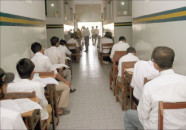TCC challenges BVI court order
Experts believe the appeal filed by mining company will also be rejected

The Tethyan Copper Company (TCC) has challenged the ruling of a British Virgin Islands (BVI) court that Pakistan can retain its assets earlier attached in connection with the Reko Diq mines case and has filed an appeal against the High Court of Justice’s order in the BVI's Court of Appeal.
On November 20 last year, the TCC sought attachment of Pakistan’s assets for the enforcement of the $6 billion award that the International Centre for Settlement of Investment Disputes (ICSID) slapped on the country on July 12, 2019 for revoking a contract for mining at Reko Diq in Balochistan.
BVI high court judge Gerhard Wallbank on December 10, 2020 attached the Roosevelt Hotel in New York and the Scribe Hotel in Central Paris – assets belonging to the Pakistan International Airlines (PIA) Investment Limited – to enforce the award.
However, the same court retracted its earlier order and ruled that the PIA could retain its two assets, a development that Pakistani officials described as a legal victory.
The BVI high court not only rejected the TCC plea for attachment of the PIA assets but also imposed a $5 million cost as well as $50,000 penalty on the company.
Read more: Virgin Islands court unfreezes PIA assets in Reko Diq case
A senior official in the law ministry revealed to The Express Tribune that the BVI court ruled that it has no jurisdiction, and all ex-parte orders obtained by the TCC were based on an incorrect reading of law.
It set aside the order for registration of the ICSID award on the basis that the court was misled on the issue of state immunity, and lack of formal service of the claim form.
The court also entirely set aside provisional charging order against the PIA’s shares in the BVI companies “as the Charging Orders Act 2020 is not yet in force, and that the TCC has failed to establish at the ex-parte hearing extreme circumstances” that will warrant treatment of the PIA as a state organ. A lawyer, who has expertise in international law, hoped that the fate of the TCC appeal would be rejected.
The ICSID committee has also concluded proceedings initiated by Pakistan for the annulment of $6 billion award in Reko Diq case. Sources in the law ministry said Minister for Law Dr Farogh Naseem also took part in the annulment proceedings through video link.
The decision on Pakistan's annulment plea is still awaited. The sources told The Express Tribune that Pakistan has raised several grounds to invoke annulment proceedings.
Legal experts said Pakistan’s chances of having its $6 billion penalty in the Reko Diq case annulled have received a boost after the ICSID committee set aside a €128m arbitral award slapped on Spain.
The committee set aside the award after an arbitrator – Stanimir Alexandrov who had represented the claimants in the case against Islamabad as well – was found involved in concealing information.
On June 11, 2020, a three-member ICSID ad hoc committee, headed by Ricardo Ramírez-Hernández of Mexico and comprising Makhdoom Ali Khan of Pakistan and Dominique Hascher of France, annulled the penalty imposed on Spain in favour of a solar power investor as Alexandrov failed to disclose a longstanding professional relationship with an expert witness from the law form Brattle Group.
Also read: ‘Out-of-court settlement with Tethyan Copper Company possible’
Earlier, Pakistan had applied to disqualify the Bulgarian arbitrator from hearing the case on the grounds that the claimants were relying on a rare valuation method that was also at issue in another case in which he was acting as counsel.
However, Pakistan’s legal team Allen & Overy LLP was unable to convince the World Bank president, who rejected the objection. Legal experts believe that Islamabad’s legal strategy was poor as it had raised its objection over all three members of the tribunal.
If the legal team had focused on Alexandrov alone, the objection over his conflict of interest could have been accepted, they said.
Now Pakistan has approached the ICSID again for the annulment of the award in the Reko Diq case. After the ICSID committee’s decision, Pakistan has again raised the same objection over Alexandrov’s inclusion in the tribunal.
Alexandrov had ties to the Brattle Group, a legal firm which had represented the TCC in the case against Pakistan. The ICSID committee annulled the Energy Charter Treaty award won by UK investment fund Eiser Infrastructure and a subsidiary in its entirety.
It found that Alexandrov’s failure to disclose the relationship between Carlos Lapuerta of the Brattle Group and created a “manifest appearance of bias” which meant that the tribunal was not properly constituted and that there had been a serious departure from a fundamental rule of procedure – two grounds for annulment under the ICSID Convention.
It is understood to be the first time in the ICSID’s history that an award has been annulled on the basis of an arbitrator’s lack of independence and impartiality.
Former Pakistan attorney general Makhdoom Ali Khan replaced original panelist Teresa Cheng, who stepped down when she became Hong Kong’s secretary for justice in 2018.
The claimant used Gibson Dunn & Crutcher for the annulment proceeding, having used Allen & Overy in the arbitration. Spain relied on government lawyers throughout the dispute, also retaining Curtis Mallet-Prevost Colt & Mosle for the annulment phase.
Eiser was one of the numerous investors to bring treaty claims in response to Spain’s reforms to its subsidy regime for renewable energy, and the first to prevail in such a claim.
In its May 2017 award, a tribunal chaired by John Crook of the US ordered Spain to pay €128 million plus interest after finding that the reforms violated the ECT. Eiser’s appointee Alexandrov and Campbell McLachlan QC of New Zealand, who was chosen by Spain, joined in the unanimous ruling.
Spain filed for annulment soon after, arguing that Alexandrov had violated his obligation of independence and impartiality by failing to disclose a 15-year relationship with the Brattle Group and Lapuerta, who had been retained by Eiser as experts in the arbitration.
At the time of the Eiser arbitration, Alexandrov was a partner at Sidley Austin in Washington.
Spain argued that during his time at the firm, Alexandrov’s team had appointed the Brattle Group in nine investor-state arbitrations and that in four of those cases Lapuerta was the testifying expert – including cases that were pending at the same time as the Eiser arbitration.
The state said this relationship only became public after the Eiser award was issued, when Pakistan challenged Alexandrov in an unrelated ICSID arbitration brought by the TCC on the basis of his ties to Brattle. Alexandrov retired from Sidley Austin soon after that to set up an independent practice.
In its decision, the committee concluded that a tribunal may be held to have been improperly constituted for annulment purposes where an arbitrator lacked independence or impartiality at any time during the arbitration.
The committee also dismissed Eiser’s contention that the proper remedy for Spain would be to seek revision of the award. It said revision proceedings were primarily concerned with the substance of the award, whereas an annulment committee is tasked with protecting the “integrity of the proceedings.”
The fact that Alexandrov would have no opportunity to respond to allegations of bias against him in an annulment proceeding was thus “of little consequence.”
It also said Spain had not waived its right to raise the allegations, observing Eiser had not shown a clear instance where Spain was or reasonably ought to have been aware of Alexandrov’s relationship with Brattle before the Eiser award was issued – despite the existence of public information about the connection, including in GAR articles.
The committee said Alexandrov had a duty to disclose the relationship and had failed to do so. It declined to rule on Spain’s submission that Lapuerta was also under a duty to disclose the relationship under the IBA rules on the taking of evidence.
By depriving Spain of the opportunity to challenge him, the committee said Alexandrov had also deprived the state of seeking the benefit and protection of an independent tribunal, thus affecting its right of defence and right to a fair trial.
The failure to disclose could not be regarded as an inconsequential error.
The committee said the non-disclosure had resulted in the tribunal deliberating without any knowledge of the relationship. The fact that the award was unanimous was no bar to annulment.
Each tribunal member could be expected to have influenced the others with his views and analysis. It further noted that the tribunal adopted the damages model proposed by Lapuerta in its entirety.
While it was possible the arbitrators would have adopted the model in any event, the committee said that “Spain lost the possibility of a different award”.
The tribunal therefore concluded the failure to disclose could have had a “material effect” on the award, thus amounting to a serious departure from a fundamental rule of procedure.
It said that annulment committees are “guardians of the ICSID system” and “must set the bar high” regarding disclosure obligations. This included addressing conflicts of interests of arbitrators who also choose to act as counsel in investment disputes.
An international arbitration tribunal of the ICSID had slapped a penalty of $6 billion on Pakistan on July 12, 2019 for its 2011 decision to deny a mining lease for the Reko Diq project to the TCC, a consortium of Chilean and Canadian companies.
The tribunal – chaired by Germany’s Klaus Sachs and including Bulgarian arbitrator Stanimir Alexandrov and the UK’s Lord Hoffmann had ordered Pakistan to pay over $4 billion in damages to the TCC in addition to $1.7 billion in pre-award interest.
The tribunal found that Pakistan had unlawfully denied the TCC a lease to mine copper and gold deposits at the Reko Diq mine, located in Chagai district of Balochistan.
It held that the state had committed an unlawful expropriation under the Australia-Pakistan bilateral investment treaty. The ICSID also declared that the Supreme Court of Pakistan’s 2012 judgment in the rental power projects case was ‘arbitrary’.



















COMMENTS
Comments are moderated and generally will be posted if they are on-topic and not abusive.
For more information, please see our Comments FAQ